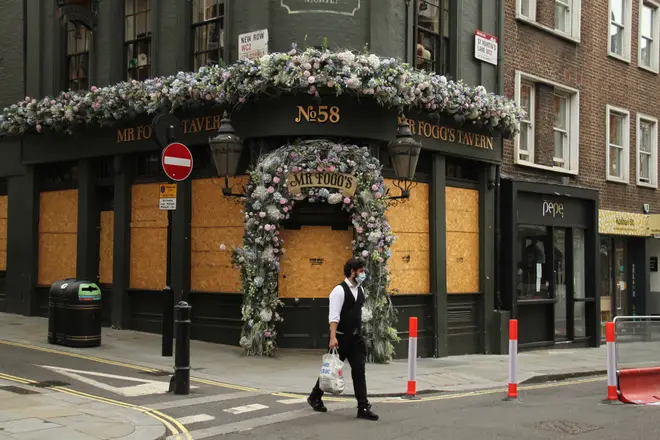
Paul Brand 10am - 12pm
1 August 2020, 08:57

Downing Street has said it will support the hospitality industry after a member of the Scientific Advisory Group for Emergencies (Sage), said England might have to consider closing pubs in order to reopen schools next month.
The comments come after England's Chief Medical Officer Chris Whitty warned that the UK has potentially reached a limit for how much of society can be opened up.
When asked about the chief medical officer Professor Chris Whitty's prediction that the country was "near the limits" of opening up society, the London School of Hygiene and Tropical Medicine academic said: "I think that's quite possible.
Read more: Plans to further ease lockdown measures in England scrapped, says PM
"I think we're in a situation whereby most people think that opening schools is a priority for the health and wellbeing of children and that when we do that we are going to reconnect lots of households.
"And so actually, closing some of the other networks, some of the other activities may well be required to enable us to open schools," Professor Medley added.
"It might come down to a question of which do you trade-off against each other and then that's a matter of prioritising, do we think pubs are more important than schools?"
Professor Whitty was speaking at a Downing Street press conference where the Prime Minister announced further easing of lockdown across England was being postponed and he warned the country "cannot be complacent" amid a rise in the prevalence of coronavirus in the community.
Read more: Boris Johnson unveils new ‘hands, face, space, get a test’ Covid-19 slogan
Asked if the Prime Minister agreed with comments made by Professor Graham Medley, a member of SAGE, that pubs may be forced to shut in order to reduce the risk of Covid-19 transmission and allow schools to open, his official spokesman said: "Our approach is a localised one where you would assess the situation on the ground and take whatever steps were required to slow the spread of the virus.
"More broadly we are committed to supporting the hospitality industry which has had a very tough time."

Boris Johnson announces delay to lockdown easing
On Friday in Downing Street, Professor Whitty said: "I think what we're seeing from the data from ONS and other data is that we have probably reached near the limit or the limits of what we can do in terms of opening up society.
"So what that means potentially is that if we wish to do more things in the future, we may have to do less of some other things.
"And these will be difficult trade-offs, some of which will be decisions for government and some of which are for all of us as citizens to do.
"But we have to be realistic about this. The idea that we can open up everything and keep the virus under control is clearly wrong."
Explained: What Boris Johnson's major lockdown announcement means for you
The announcement comes after local lockdown measures were announced in parts of the north-west of England of parts of West Yorkshire, banning people from different households meeting indoors or in gardens following a spike in virus cases.
Speaking at a Downing Street press conference on Friday alongside Prof Whitty, Mr Johnson said: "As we see these rises around the world, we can't fool ourselves that we are exempt. We must be willing to react to the first signs of trouble."
He said that with numbers rising "our assessment is that we should squeeze that brake pedal... in order to keep the virus under control".

Household mixing banned in parts of northern England in virus crackdown
The Office for National Statistics said there has been an increase in the number of people testing positive for coronavirus in England.
According to the ONS, between July 20 and 26 there were around 0.78 new Covid-19 infections for every 10,000 people in the community population in England - equal to around 4,200 new cases per day.
This is up from an estimated 2,800 new cases a day in the previous week.